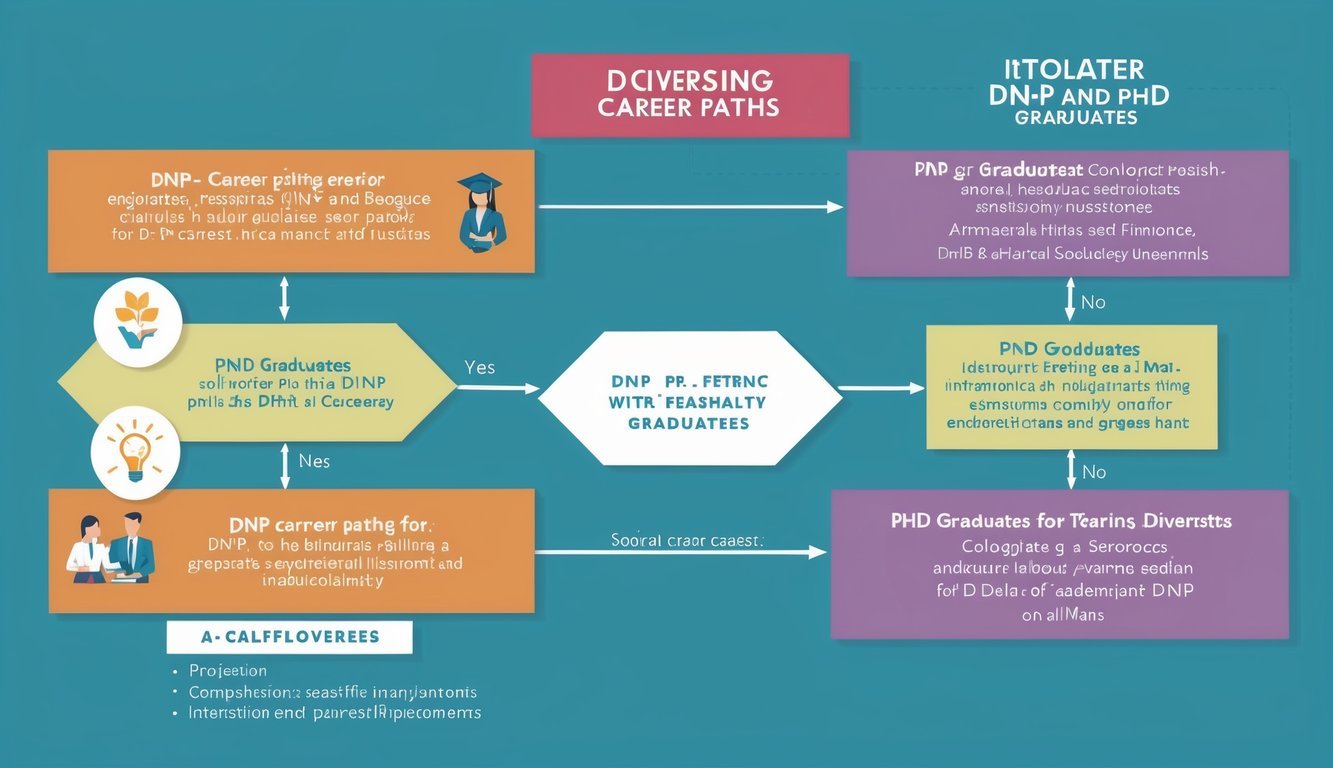When considering advanced degrees in nursing, you need to understand the difference between a Doctor of Nursing Practice (DNP) and a Doctor of Philosophy (PhD).
The DNP focuses on clinical practice and practical application, while the PhD emphasizes research and academic scholarship.
Your choice between these two terminal degrees can significantly impact your career trajectory, job opportunities, and professional responsibilities.

Both degrees require a strong educational background, including a Bachelor of Science in Nursing (BSN) and an active registered nurse (RN) license.
The DNP is designed for those aiming to enhance their clinical expertise and leadership skills, while the PhD prepares you for roles in research, teaching, and academia.
To assist in your decision-making, it is vital to evaluate each program’s curriculum, outcomes, and career paths associated with each degree.
By exploring the key differences between the DNP and PhD in nursing, you can better align your educational goals with your career aspirations.
For a more in-depth understanding, you can learn about the specifics of each program from resources such as Nurse.org and NursingProcess.org.
Understanding the Degrees
Both the Doctor of Nursing Practice (DNP) and the Doctor of Philosophy (PhD) in Nursing are terminal degrees that prepare you for advanced roles in nursing.
Each degree has unique focuses, outcomes, and career paths, making it essential to understand their distinctions.
Doctor of Nursing Practice (DNP) Overview
The Doctor of Nursing Practice (DNP) is a clinical practice-focused degree designed to enhance your skills in patient care and clinical leadership.
This program emphasizes evidence-based practice, allowing you to implement research findings directly in healthcare settings.
A DNP typically requires 1,000 clinical practice hours, which can include your nursing experience.
The duration of the program often ranges from two to four years, depending on whether you study full-time or part-time.
Many DNP graduates pursue leadership roles, such as Nurse Practitioners or Clinical Nurse Leaders, impacting healthcare delivery.
DNP programs blend rigorous coursework with practical experience, focusing on improving patient outcomes.
You will learn to assess, plan, and evaluate healthcare strategies to advance your practice.
Doctor of Philosophy (PhD) in Nursing Overview
The PhD in Nursing is a research-focused degree that prepares you for roles in academic and scientific inquiry.
This program emphasizes developing new knowledge in nursing science through research methodologies and theoretical frameworks.
PhD programs typically take longer to complete, often requiring 3 to 6 years, and involve significant research projects.
You will engage in theoretical discussions and conduct original research that contributes to the nursing field.
Graduates of PhD programs commonly pursue careers as nurse educators, researchers, or policymakers.
Your training will equip you to address complex health issues and enhance nursing practices through academic scholarship, making this pathway vital for those interested in shaping the future of nursing science.
For more detailed comparisons, visit Nurse.org and NursingProcess.org.
Educational Pathways and Curriculum
When considering advanced nursing degrees, understanding the educational pathways and curriculum is essential for making an informed choice.
Each program offers unique opportunities that cater to different career goals and professional roles.
DNP Programs and Clinical Focus
DNP programs emphasize clinical practice and prepare you for advanced roles in healthcare.
These programs typically require you to complete a capstone project that applies theoretical knowledge to practical problems in clinical settings.
The curriculum often includes coursework in advanced clinical skills, leadership, and health policy along with a substantial requirement for clinical hours.
You will engage in real-world practice, often working part-time while studying.
A DNP degree can usually be obtained in 2 to 4 years, depending on whether you study full-time or part-time.
This degree is ideal for those seeking to improve patient outcomes and lead in healthcare environments.
For more information on these programs, consider visiting NurseJournal.
PhD in Nursing Research and Academia
In contrast, a PhD in Nursing is focused on research and academic leadership.
This program prepares you to contribute to the field through evidence-based research and theory development.
The curriculum includes rigorous academic training and a significant research component, culminating in a dissertation that demonstrates your original research.
PhD candidates typically engage in courses on research methodology, data analysis, and nursing theory.
This education can take approximately 3 to 5 years to complete.
As a PhD holder, you can pursue roles in academia, research institutions, or healthcare policy.
Learn more about the distinctions in graduate nursing programs at Nursing Process.
Career Trajectories and Opportunities

Choosing between a DNP and a PhD can significantly influence your career path in nursing.
Each degree offers distinct opportunities tailored to your professional interests and goals.
Clinical Leadership and Advanced Practice Roles
With a Doctor of Nursing Practice (DNP), you are well-equipped for clinical leadership and advanced practice positions.
DNP graduates often pursue roles such as nurse practitioners, clinical nurse specialists, or nurse-midwives.
These positions enable you to provide direct patient care, implement evidence-based practices, and lead healthcare teams.
In these roles, you may become involved in advanced nursing practice, focusing on improving patient outcomes through clinical innovations.
DNP holders often work alongside nursing leaders to enhance healthcare delivery systems.
Certifications such as certified registered nurse anesthetist (CRNA) can also be pursued, expanding your career prospects in specialized fields.
For more insights on DNP career options, visit Nurse Journal.
Academia and Research Positions
On the other hand, if your passion lies in research and education, a PhD in Nursing prepares you for academia and scientific roles.
As a nurse scientist or nurse researcher, you can engage in groundbreaking studies that shape nursing practices.
Positions in academia, such as nursing faculty or nursing instructors, allow you to educate future nurses while conducting research.
PhD holders often take on significant responsibilities as nurse educators, developing curriculum and guiding students in their clinical training.
You may also serve as a nurse executive, influencing policy and administrative decisions.
For further details about PhD career paths, consider exploring Maryville Nursing.
Role in Healthcare Delivery and Policy
Understanding the specific contributions of Doctor of Nursing Practice (DNP) and Doctor of Philosophy (PhD) holders can clarify their roles in shaping healthcare delivery and policy.
Both degrees influence various sectors of healthcare, from administration to education and innovation.
Impact on Healthcare Policy and Administration
DNP professionals often engage directly in healthcare policy development, advocating for patient care improvements and evidence-based practice.
They are equipped to implement changes within the healthcare delivery system through their focus on practical applications of research.
PhD holders tend to focus more on health policy research, shaping broader healthcare policies using rigorous academic frameworks.
Their findings guide effective healthcare administration decisions, which improve healthcare outcomes and population health management.
Through initiatives like full practice authority, both DNP and PhD graduates can influence care systems, ensuring nursing perspectives contribute to legislation and administration.
Directing Nursing Education and Healthcare Innovation
DNP graduates play a pivotal role in advancing nursing education.
They often take leadership positions in shaping curricula that emphasize evidence-based practice, which directly impacts patient care quality.
On the other hand, PhD nurses typically conduct research that drives healthcare innovation.
Their studies illuminate new methodologies that can transform healthcare practices and systems.
Both degrees contribute significantly to policy research, promoting advancements in nursing education and the healthcare delivery system.
This synergy fosters an environment of continuous improvement, ensuring that nursing adapts effectively to evolving healthcare needs and challenges.
Practical Considerations and Decision-Making
When choosing between a Doctor of Nursing Practice (DNP) and a Doctor of Philosophy (PhD) in Nursing, it’s essential to consider program length, commitment, financial implications, and salary prospects.
These factors can greatly influence your career trajectory and overall satisfaction.
Program Length and Commitment
The duration of DNP and PhD programs varies significantly.
Typically, a DNP degree can be completed in 3 to 4 years for those already holding a BSN, while a PhD in Nursing program may take 4 to 6 years to finish.
DNP programs often emphasize clinical practice hours and may include a clinical practicum focusing on applying advanced clinical skills.
In contrast, PhD programs prioritize research, requiring you to complete an original dissertation.
Your choice may hinge on whether you prioritize hands-on practice or research.
Be aware that higher clinical practice involvement is a hallmark of DNP coursework, while PhD programs emphasize scholarly inquiry and theoretical frameworks.
Financial Implications and Salary Prospects
Financial considerations play a pivotal role in your decision.
DNP-prepared nurses often see salaries ranging from $100,000 to $130,000, depending on their roles and specialization.
Conversely, graduates with a PhD may command salaries that range from $70,000 to over $120,000, particularly in academic or research positions.
You should also factor in potential student debt.
DNP programs can involve significant investment but may yield quicker financial returns due to higher starting salaries in clinical settings.
Understanding the long-term financial implications can guide your decision and ensure alignment with your career goals.
Considering these aspects will help you make an informed choice that suits your professional aspirations.

